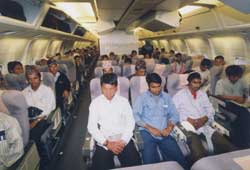 The goings-on at Tribhuban International Airport form the backbone for the Beed's column this week. It is of considerable irony that in recent times, the number of tourists flying into the kingdom has dwindled while the Nepalis seeking foreign employment leave in droves. In the Golden Years of Tourism, airport conversations with visitors revolved around treks, tours and how not to get ripped off. Now, with the mass exodus of our Nepali brethren, things are different.
The goings-on at Tribhuban International Airport form the backbone for the Beed's column this week. It is of considerable irony that in recent times, the number of tourists flying into the kingdom has dwindled while the Nepalis seeking foreign employment leave in droves. In the Golden Years of Tourism, airport conversations with visitors revolved around treks, tours and how not to get ripped off. Now, with the mass exodus of our Nepali brethren, things are different. For many it is their first trip on an aeroplane. As they go through the long queues at the baggage security, they start eyeing the check-in counters. Each counter is a possible obstacle in their quest for a 'foreign' job that pays in 'foreign' currency. The sight of security or immigration officials make them shrink into themselves-they are so self-effacing to render themselves invisible. They are afraid of interrogations, of being sent back from international airports. They have all heard those stories, usually from manpower agencies that exaggerate to highlight their own competitive advantage.
The Bipalis know that if there is any glitch at the airport they are on their own. They do not request window or aisle seats: the very act of being issued a boarding pass is the first hurdle overcome. The men huddle together, anxiously scanning their passes to reassure themselves that they have not been handed fakes.
At the immigration counter, they line up, rewriting the departure card several times with fierce concentration, as they would in a school exam. Those who got through their SLC help the others. Immigration officials know there is nothing to extract from these people, and let them through after asking standard questions for which they receive the standard answers. Once past immigration as far as these Bipalis are concerned, they have crossed the main hurdle in Nepal. All too often the final routine security check is their undoing.
A weary airport official who processes nearly four hundred Bipalis a day, told the Beed that in their excitement of boarding the plane, many leave their bags in the x-ray machines, some even forget passports and valuable documents. TIA authorities are changing tactics to serve these Bipalis, their newest and most consistent customers on a one way ticket out of here. The workers are our new air travellers, and there is a tacit understanding that they should have the chance to exploit the opportunity to better their lives.
At the point of no return the Bipalis hug each other-new-found friends who are bound by the same circumstances-as they dream aloud of buying adjacent plots of land in a Kathmandu suburb, even the same make in motorcycles. They are heading out but their goals are already turned homewards. They speak loudly of a cousin, a neighbour, a friend who sends money home for his family, who returned laden with gifts, gold, a big music system and American dollars. The next breed of the Nepali consumer is in the making.
As political parties repeat their rhetoric, hundreds of Nepalis leave for bidhes. Their remuneration lubricates an economy that is otherwise close to a standstill. While countries around us develop strong internal economic structures, Nepal's myopia continues to rely on tenuous external links. Our only competitive and comparative advantage is exporting cheap labour. The lahures of the last century are the Bipalis of this one.
Readers can post their comments or suggestions to [email protected]



